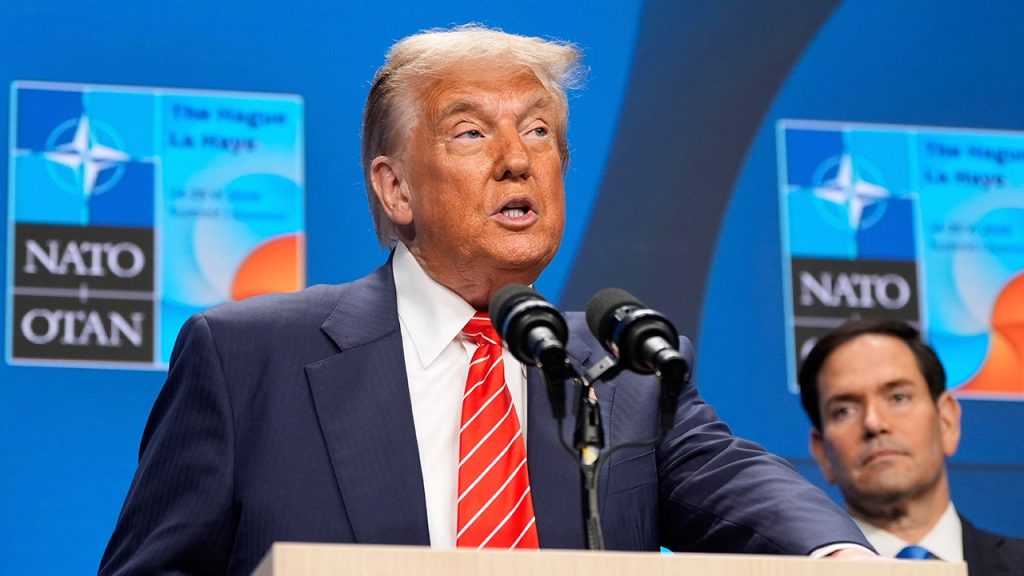An Iranian group called the “Blood Covenant” has reportedly secured over $40 million through crowdfunding for the assassination of former President Donald Trump. This information comes from the Middle East Media Research Institute (MEMRI), which states that the organization has issued a public appeal for donations, featuring a poster of Trump in crosshairs. This escalation follows recent U.S. airstrikes targeting Iranian nuclear facilities, leading to grave implications regarding U.S.-Iran relations and security concerns for the former president.
| Article Subheadings |
|---|
| 1) Understanding the “Blood Covenant” Movement |
| 2) Context of the Assassination Call |
| 3) Official Responses and Security Measures |
| 4) The Broader Implications for U.S.-Iran Relations |
| 5) Future Perspectives on Threats and Diplomacy |
Understanding the “Blood Covenant” Movement
The “Blood Covenant” is a militant Iranian movement claiming responsibility for crowdfunded efforts to assassinate Donald Trump. This initiative reportedly raised over $40 million, emphasizing a direct challenge to U.S. influence and security. The movement’s website features provocative imagery, including Trump in the crosshairs of a target, alongside appeals for public donations to help “establish stable peace.”
This “Blood Covenant” mobilizes religious rhetoric, referencing a verse from the Quran that encourages believers to expend their wealth and lives in the pursuit of what they deem righteous. MEMRI has characterized this as a potent call to jihad, which legitimizes the notion of martyrdom associated with Trump’s assassination. Such appeals resonate deeply within the Iranian context, where religious and political ideologies often intertwine to mobilize public sentiments against perceived enemies.
Context of the Assassination Call
The timing of the “Blood Covenant”’s threats coincides with escalating tensions between the U.S. and Iran, particularly following airstrikes on Iranian nuclear facilities by the U.S. These military actions have increased hostilities, prompting the Iranian regime’s officials to mirror sentiments of outrage and incitement from the religious establishment.
In recent days, Iranian leaders, including members of the Assembly of Experts close to Supreme Leader Ali Khamenei, have openly called for Trump’s assassination. These calls reportedly stem from a perceived threat by Trump against Khamenei, although Trump has stated that he has acted to prevent such an event. This cycle of retaliation and incitement underscores a dangerous environment plagued by rhetoric that not only incites violence but reveals deep-rooted enmity.
Official Responses and Security Measures
In light of these threats, the U.S. Secret Service emphasizes that the safety and security of former President Trump remains a paramount concern. An official stated, “We operate in a heightened and very dynamic threat environment.” This indicates the U.S. government has heightened its vigilance in monitoring potential risks stemming from international threats.
Moreover, standard protocols have been reinforced to ensure comprehensive protection measures are in place. As a part of operational integrity, the Secret Service has refrained from commenting on specific intelligence matters. However, there is a noted collaboration with local, state, and federal law enforcement agencies aimed at bolstering protective measures around Trump amidst these threats.
The Broader Implications for U.S.-Iran Relations
The implications arising from the “Blood Covenant” and the assassination threats extend beyond individual security concerns, as they point to deteriorating U.S.-Iran relations. Analysts argue that such movements and public incitements assist in creating a narrative justifying further hostile actions, potentially escalating military conflicts in the region.
The increased calls from Iranian clerics and officials for violence against Trump indicate a collective sentiment within Iran that seeks to unify factions against a common enemy. This divisive climate threatens to perpetuate cycles of violence and retaliation, making diplomatic engagement increasingly challenging. The rhetoric surrounding the movement also reflects a broader anti-Western sentiment, rooted in historical grievances that continue to affect relations between the U.S. and Iran.
Future Perspectives on Threats and Diplomacy
The international community, particularly governments invested in peace and stability in the Middle East, must navigate a complex landscape. The emergence of movements such as the “Blood Covenant” signals not only ideological battles but also tangible threats against individuals, notably those in positions of power.
As tensions simmer, the necessity for diplomatic efforts to mitigate threats becomes even more pressing. Experts suggest that any long-term resolution requires addressing the underlying grievances fueling such militant movements. Considering the heavy hand played by both the Iranian government and local extremist factions, the forthcoming diplomatic engagements must tread carefully, promoting dialogue while simultaneously deterring violence.
| No. | Key Points |
|---|---|
| 1 | The “Blood Covenant” has reportedly raised over $40 million for the assassination of Donald Trump. |
| 2 | The movement employs religious justifications from the Quran to legitimize its actions. |
| 3 | There has been a notable increase in public calls for violence from Iranian officials and clerics. |
| 4 | The U.S. Secret Service is enhancing security measures to protect Trump amid these threats. |
| 5 | Escalating threats demonstrate a profound crisis in U.S.-Iran relations. |
Summary
In summary, the emergence of the “Blood Covenant” has underscored a significant threat to former President Donald Trump, reflecting the volatile and dangerous nature of U.S.-Iran relations. As public calls for assassination gain momentum within Iranian society, international diplomatic efforts become critical in addressing both security threats and the underlying grievances that spur such movements.
Frequently Asked Questions
Question: What is the “Blood Covenant”?
The “Blood Covenant” is a militant Iranian movement that has raised over $40 million through crowdfunding for the assassination of former President Donald Trump, using religious appeals to justify their actions.
Question: What triggered the threats against Trump?
The threats followed U.S. airstrikes on Iranian nuclear facilities, escalating tensions and prompting Iranian officials to call for violent retaliation against Trump.
Question: How has the U.S. responded to these threats?
The U.S. Secret Service has stressed the heightened security measures in place to protect former President Trump and stated that they collaborate with various agencies to ensure his safety.


